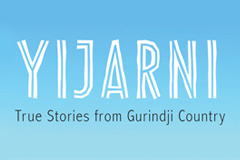Our Sound collection houses approximately 40,000 hours of audio, most of which is unique and unpublished. The recordings document Aboriginal and Torres Strait Islander languages, ceremonies, music and oral histories, and also include a small number of copies of significant historical recordings held in overseas and interstate collections, selected published recordings and broadcast materials.
What is the material like?

Unpublished recordings in our Sound collection vary greatly in sound quality and content. Very few of them were made in a studio environment or with the assistance of an experienced audio engineer. Some of them contain a lot of background noise like cars, kids, chickens, and gusty winds.
The content of the recordings varies depending on the interests or aims of the person who created them. Some recordings made by linguists, for instance, feature texts such as traditional stories or oral history accounts, while others focus solely on vocabulary or sentence elicitation. Other audio recordings address a very wide range of topics and feature multiple interviews, which may be unrelated to Aboriginal and Torres Strait Islander studies.
ANU Research Fellow and AIATSIS Member Dr Patrick McConvell worked with Gurindji elder Jimmy Manngayarri (Kurrajnginyi) to create recordings forty years ago during the time of the Gurindji walk-off and subsequent native title claims. Those recordings featured in the video below now form part of the Sound collection.
Significance statement... Audio collection
Loss of land has some remedy in law (Mabo, Wick) but loss of language bars the way back to culture and heritage.
— Professor Ghil’ad Zuckermann, 28 July 2014
The Audio sub-collection contains approximately 39,000 hours of recordings of most, if not all, known Australian Indigenous languages – some 250 languages and 600-700 dialects. This is a remarkable achievement given the success of past policies that led towards linguistic extinction (especially the teaching of children only in English) or occasionally, glottophagy, whereby a more popular or dominant language or dialect replaced – effectively ate – the less popular or less commonly spoken language in normal usage.

Approximately 40% of the sub-collection concerns linguistics and 45% musicology, while 25% comprises oral history, events of historical importance and personalities (NB 10% is hybrid). A significant feature of the sub-collection is the many original field recordings made by Australia’s most outstanding researchers in the field of Indigenous linguistics including Luise Hercus, Gavin Breen, Alice Moyle, Janet Mathew and Lynette Oates, and in Indigenous musicology, especially Alice Moyle and Stephen Wild.
Significant largely because of its close documentation of daily life, this sub-collection includes:
- Records of immense value to documentary linguists as they construct dictionaries of uncommon languages and refine the dictionaries, grammars and thesauri of more widely spoken languages, and pronunciation guides for revival linguists and communities seeking to recover their ancestors’ language. These products lead to enhanced interpretation of other sources and cross-cultural understanding, and can provide pathways to improved wellbeing amongst Indigenous Australians.
- Numerous musical and ceremonial performances, some of which are little or no longer undertaken, but which are important to identity and cultural heritage.
- Evidences of diversity of thought and of environmental knowledge e.g. weather knowledge, site descriptions, ethno-botany, biology, medicine, and ecological ideas.
- Recordings of crucial events and with individuals who have shaped the modern Indigenous story.
- an interview with Eddie Mabo about the organisation of fishing rights among his people, the issue at the heart of the historic Mabo case
- interviews and sound recordings made at the �?Tent Embassy’
- interviews about the Freedom Ride, one event that prepared the ground for the successful 1967 referendum that removed two discriminatory clauses from the Australian Constitution and saw Indigenous Australians counted in the census for the first time
- vox populi recordings at Prime Minister Kevin Rudd’s apology to Australia’s Stolen Generations.
This is the largest, most comprehensive, and well documented collection of sound relating to the first peoples of Australia and the Torres Strait Islands. It is a valuable central holding for linguistic, historic, and ethno-musicological research, identity recovery, modern media adaption / reinterpretation, and even climate change research.
Vincent O’Donnell
19 August 2014




